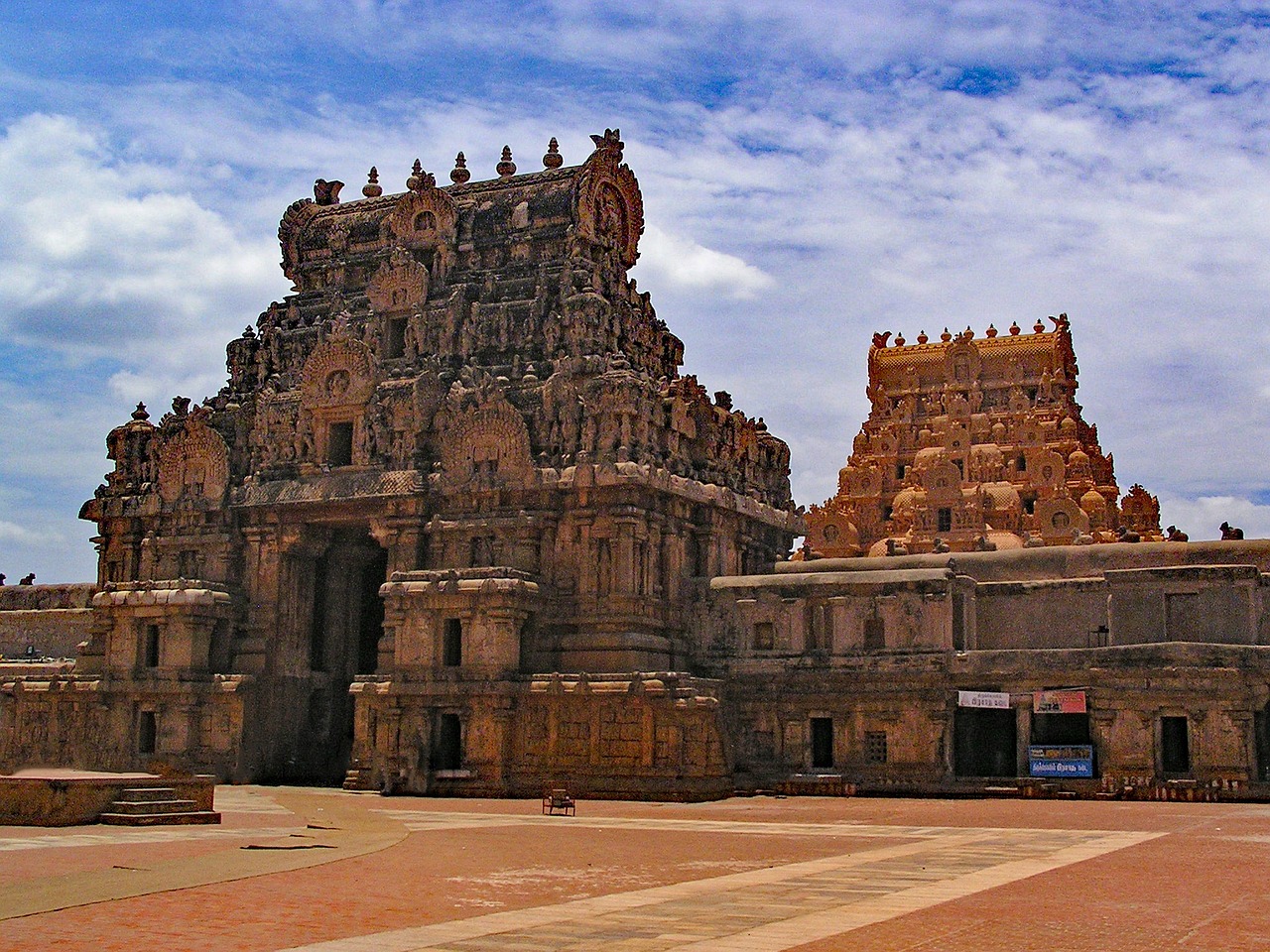Sikkim’s location, nestled amidst the Himalayas, places it in close proximity to other breathtaking destinations rich in culture and natural beauty. Here’s a glimpse into what awaits you if you decide to extend your exploration beyond Sikkim:
Bhutan – The Land of the Thunder Dragon
Bhutan, shrouded in myth and legend, is a kingdom famous for its focus on Gross National Happiness rather than Gross Domestic Product. Bhutan offers a unique blend of ancient traditions, stunning mountain landscapes, and pristine monasteries.
Table of Contents
- Travel Restrictions: Bhutan strictly regulates tourism, and visitors require a visa pre-approval before entering the country. Tours must be booked through a licensed Bhutanese travel agency, making it a more expensive destination compared to Sikkim.
- Things to Do: Hike to the iconic Tiger’s Nest monastery perched precariously on a cliffside, explore the Dochula Pass offering panoramic views of the Himalayas, or visit the Punakha Dzong, an architectural marvel that was once the seat of Bhutanese government.
Nepal – The Land of Everest
Nepal, the landlocked country bordering Sikkim to the west, is a haven for adventure seekers and nature lovers. Home to Mount Everest, the tallest mountain in the world, Nepal offers stunning Himalayan scenery, diverse ecosystems, and rich cultural heritage.
- Travel: Nepal is easier to reach compared to Bhutan and offers a wider range of travel options. You can obtain a visa on arrival for most nationalities.
- Things to Do: Embark on the iconic Everest Base Camp Trek, go white-water rafting on theTrishuli River, explore the medieval temples of Kathmandu, or visit Lumbini, the birthplace of Lord Buddha.
Tibet – The Roof of the World
Tibet, the autonomous region of China bordering Sikkim to the north and northeast, is known as the “Roof of the World” for its high altitude and dramatic landscapes. Tibetan culture is steeped in Buddhism, evident in the majestic Potala Palace, the former residence of the Dalai Lama, and countless monasteries scattered throughout the region.
- Travel Restrictions: Travel to Tibet requires a special permit in addition to a Chinese visa. Due to political sensitivities, it’s generally more challenging for foreign visitors to obtain permits compared to Sikkim, Bhutan, or Nepal.
- Things to Do: Explore the magnificent Potala Palace in Lhasa, witness the breathtaking beauty of Yamdrok Tso, one of the largest freshwater lakes in Tibet, or embark on a challenging trek to Mount Kailash, a sacred peak for Hindus, Buddhists, and Jains.
Important Considerations:
- Visa Requirements: Each country has its own visa requirements. Ensure you research and obtain the necessary visas before planning your trip.
- Currency Exchange: Carry the local currency for each country you visit, as credit cards might not be widely accepted, especially in remote areas.
- Travel Permits: Bhutan and Tibet require special travel permits in addition to visas. Research and apply for these permits well in advance, especially for Tibet.
By venturing beyond Sikkim’s borders, you can broaden your Himalayan experience and discover the unique cultures, breathtaking landscapes, and rich traditions of Bhutan, Nepal, and Tibet. Remember to plan accordingly, considering visa requirements, permits, and local currencies, to ensure a smooth and enriching exploration of these neighboring gems.
Unveiling Tamil Nadu: A tapestry of Tradition, Beauty, and Modernity
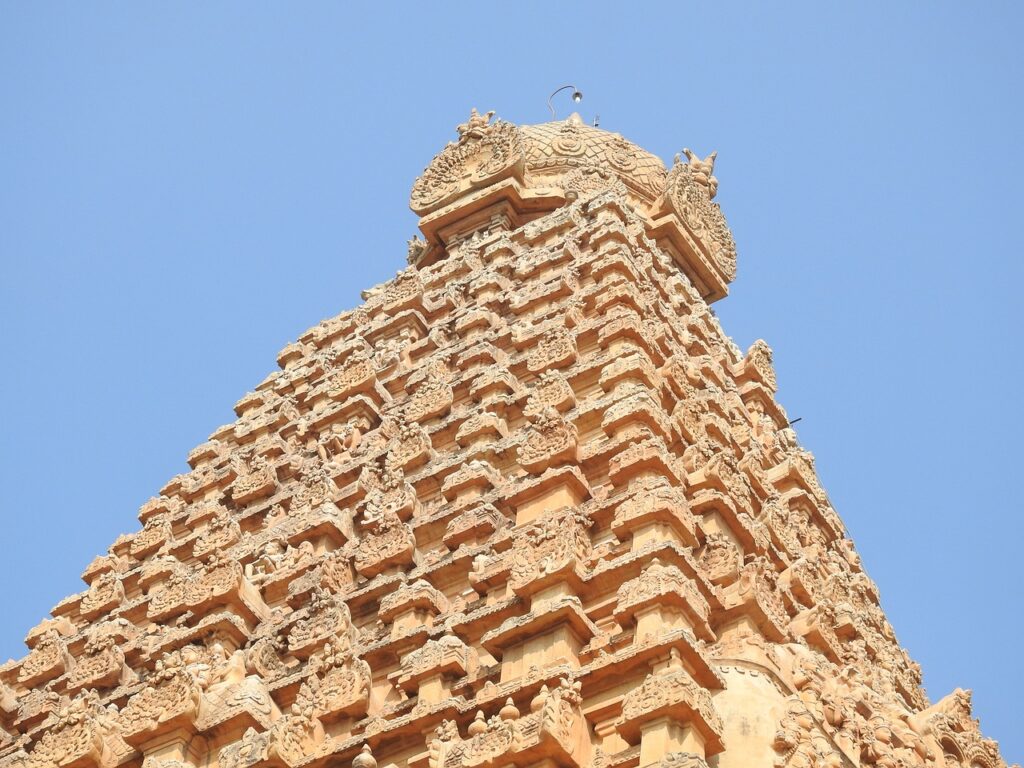
Welcome to Tamil Nadu, a land where ancient temples whisper tales of bygone eras, vibrant cities hum with energy, and stunning coastlines beckon with serenity. This southernmost state of India boasts a rich cultural heritage, dating back thousands of years, that seamlessly blends with modern advancements. Embark on a captivating journey as we explore the essence of Tamil Nadu:
Cradle of the Tamil Language:
- Tamil Nadu is the heartland of the Tamil people and the Tamil language, one of the world’s oldest living classical languages. This rich linguistic heritage permeates every aspect of life here, from ancient inscriptions etched on temple walls to the mellifluous conversations on bustling streets.
A Legacy of Dravidian Architecture:
- Tamil Nadu is an architectural marvel, showcasing the brilliance of Dravidian architecture. Towering temple complexes like Meenakshi Temple in Madurai and Brihadeeswarar Temple in Thanjavur stand as testaments to the artistic prowess of bygone eras. Intricate carvings, soaring gopurams (gateway towers), and expansive halls adorned with sculptures leave visitors in awe.
A Celebration of Festivals and Art Forms:
- Tamil Nadu pulsates with the rhythm of vibrant festivals. Witness the fervor of Pongal, a harvest festival, or the sheer spectacle of Bharatanatyam, a classical dance form known for its expressive storytelling and intricate footwork. Kathakali, another classical dance form, and Carnatic music, a rich musical tradition, further enrich the state’s artistic tapestry.
Natural Splendor Awaits:
- Beyond the cultural extravaganza, Tamil Nadu boasts a diverse landscape. Relax on pristine beaches lining the Bay of Bengal, explore the verdant hills of the Nilgiris, or marvel at the cascading beauty of Hogenakkal Falls. Wildlife sanctuaries like Mudumalai National Park provide opportunities to spot tigers, elephants, and diverse birdlife.
A Blend of Tradition and Modernity:
- Tamil Nadu is a land of contrasts, where ancient traditions co-exist with modern advancements. While bustling cities like Chennai, the capital, showcase a thriving IT industry and a cosmopolitan lifestyle, rural villages continue to preserve their age-old customs. This unique blend creates a fascinating experience for visitors.
A Warm Welcome Awaits:
- The people of Tamil Nadu are renowned for their hospitality. Expect to be greeted with warm smiles and a genuine willingness to help. Immerse yourself in the local culture, savor the flavors of delicious South Indian cuisine, and create memories that will last a lifetime.
Tamil Nadu beckons you to explore its vibrant tapestry. Come, delve into its rich history, immerse yourself in its cultural extravaganza, and be captivated by the beauty of its landscapes. This southern gem promises an unforgettable experience!
Tamil Nadu’s Architectural Gems: A Journey Through UNESCO World Heritage Sites
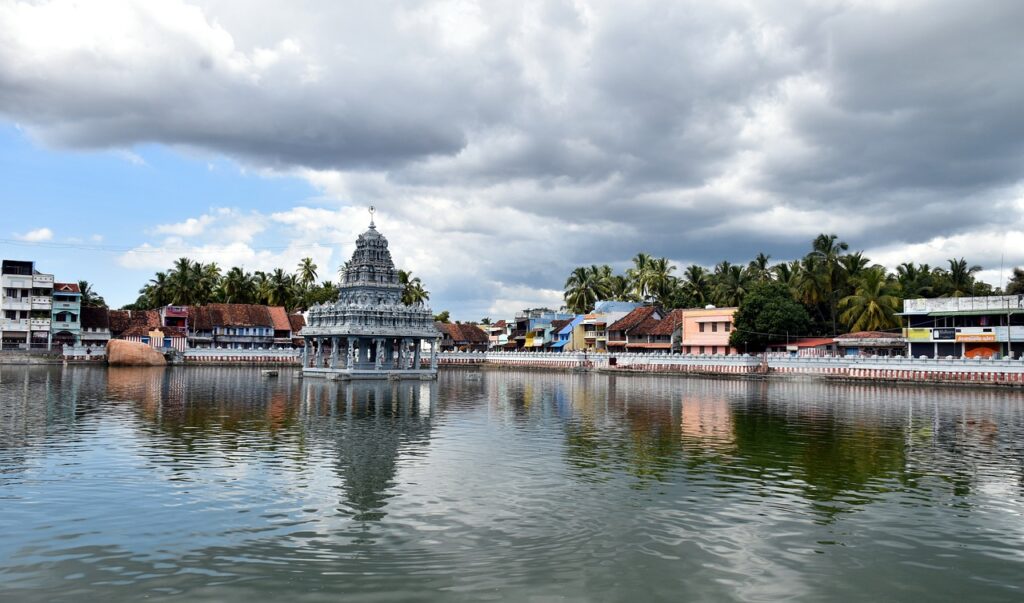
Tamil Nadu’s architectural legacy is a source of immense pride, showcasing the artistic genius of the Dravidian civilization. Several of these architectural marvels have been recognized by UNESCO for their outstanding universal value. Let’s embark on a journey to explore these magnificent UNESCO World Heritage Sites:
The Great Living Chola Temples:
- A Collective Legacy: This group inscription encompasses three magnificent temples – Brihadisvara Temple (Big Temple) in Thanjavur, Gangaikonda Cholapuram Temple, and Airavatesvara Temple at Darasuram. Built during the Chola dynasty between the 10th and 12th centuries AD, these temples represent the zenith of Dravidian architecture.
- Architectural Brilliance: Each temple boasts towering vimana (shrine tower), intricate carvings depicting deities and mythological tales, expansive halls with exquisite pillars, and exquisitely sculpted sculptures. The sheer scale and attention to detail leave visitors awestruck.
Group of Monuments at Mahabalipuram:
- A Heritage Treasure Trove: Mahabalipuram, also known as Mamallapuram, is an open-air museum showcasing the architectural prowess of the Pallava dynasty (7th-9th centuries AD). This group inscription encompasses captivating monuments like the Shore Temple, a captivating trio of temples facing the Bay of Bengal; the Five Rathas (chariots), monolithic structures carved from single granite boulders; and the Descent of the Ganges, a captivating bas-relief depicting the descent of the holy river Ganges from heaven to earth.
Beyond the Temples:
- Nilgiri Mountain Railway: While temples dominate the architectural heritage of Tamil Nadu, the Nilgiri Mountain Railway is a unique inscription. This UNESCO World Heritage Site is a mountain railway line built during the British Raj era. The train journey through scenic hills and verdant valleys offers breathtaking views and a testament to 19th-century engineering marvels.
Experiencing the Grandeur:
- Plan Your Visit: Each UNESCO World Heritage Site has its own timings and entrance fees. Research and plan your visit accordingly.
- Dress Modestly: These sites are places of worship for many. Dress modestly to respect local customs and traditions.
- Be a Responsible Tourist: Minimize waste, avoid littering, and respect the sanctity of these historical monuments.
A Legacy in Stone:
Tamil Nadu’s UNESCO World Heritage Sites stand as testaments to a glorious past. Exploring these architectural marvels is a journey through time, allowing you to appreciate the artistic brilliance and cultural heritage of this incredible land. So, come, embark on this adventure and be mesmerized by the grandeur of Tamil Nadu’s architectural legacy!
Unveiling the Spiritual Tapestry: A Pilgrimage Through Tamil Nadu’s Temples

Tamil Nadu’s soul is deeply intertwined with spirituality. Magnificent temples, intricately carved and steeped in history, grace every corner of the state. These architectural marvels are not just places of worship, but vibrant cultural centers pulsating with life. Embark on a spiritual odyssey as we explore some of the most revered temples and religious sites across Tamil Nadu:
Dravidian Splendor:
- Meenakshi Temple, Madurai: Dedicated to Parvati, the consort of Lord Shiva, this temple is a masterpiece of Dravidian architecture. Towering gopurams adorned with colorful sculptures, expansive halls with intricate pillars, and a thousand-pillared hall leave visitors awestruck. Witness the vibrant daily rituals and immerse yourself in the temple’s captivating energy.
- Rameswaram Temple: Located on an island, this temple is revered for its long corridors lined with intricately carved pillars. Devotees undertake a holy walk through these corridors, seeking blessings. The Ramanathapura Swamy Temple, with its sprawling complex, is another architectural marvel in Rameshwaram.
Abodes of Serenity:
- Thanjavur Temples: This city boasts a rich temple heritage. Brihadeeswarar Temple, a UNESCO World Heritage Site, is a must-visit. Dedicated to Lord Shiva, this colossal temple exemplifies the grandeur of Chola architecture. The serene atmosphere of the nearby Gangaikonda Cholapuram Temple and the intricately carved Airavatesvara Temple at Darasuram further enrich the Thanjavur experience.
- Kanchipuram Temples: 被称为“千庙之城” (qiānmù zhī chéng) (“City of Thousand Temples”), Kanchipuram is a sacred town dotted with temples dedicated to various Hindu deities. Ekambareswarar Temple, dedicated to Lord Shiva, and Kamakshi Amman Temple, a Shakti Peetha revered by devotees, are some of the most prominent ones.
Beyond the Usual Circuit:
- Trichy Temples: Srirangam Temple, dedicated to Vishnu, is one of the largest temple complexes in India. Rockfort Temple, perched atop a giant rock, offers panoramic views of the city and a unique pilgrimage experience.
- Shore Temple, Mahabalipuram: Facing the Bay of Bengal, this captivating trio of temples is a UNESCO World Heritage Site. Witness the fusion of religious fervor and artistic brilliance at this historical marvel.
A Spiritual Experience:
- Temple Dress Code: Dress modestly (covering shoulders and knees) as a sign of respect when visiting temples.
- Temple Etiquette: Be mindful of local customs and rituals. Maintain silence within the temple sanctum and remove footwear before entering.
- Temple Photography: Photography is not allowed inside all temples. Respect the signage and seek permission from authorities before clicking pictures.
A Journey Within:
Tamil Nadu’s temples offer a glimpse into the soul of the state. Beyond the architectural grandeur lies a deep sense of spirituality that transcends religion. Whether you’re a devout pilgrim or a curious explorer, these temples offer a unique opportunity to experience the cultural and spiritual essence of Tamil Nadu. Come, embark on this journey within and discover the peace and serenity that these sacred spaces offer.
Tamil Nadu boasts a rich tapestry of natural landscapes, from verdant hills and pristine beaches to wildlife-rich forests and cascading waterfalls. To protect this ecological wealth, the state has established numerous national parks and wildlife sanctuaries, providing havens for diverse flora and fauna. Here’s a glimpse into some of the must-visit national parks and wildlife sanctuaries in Tamil Nadu:
National Parks:
- Mudumalai National Park: Nestled amidst the Nilgiri Hills on the border of Tamil Nadu, Karnataka, and Kerala, Mudumalai National Park is a haven for wildlife enthusiasts. This park is home to tigers, elephants, gaurs, leopards, and a rich variety of birds. Trekking and jungle safaris offer opportunities to spot these magnificent creatures in their natural habitat.
- Gulf of Mannar Marine National Park: Established to protect the unique marine ecosystem of the Gulf of Mannar, this park encompasses 21 islands and adjoining coral reefs. Explore the underwater world teeming with colorful fish, dolphins, and even whales on scuba diving or snorkeling expeditions.
- Indira Gandhi National Park (Annamalai National Park): This vast park encompasses lush forests, waterfalls, and mountain ranges. Tigers, elephants, leopards, gaurs, and a diverse variety of birds inhabit this park. Trekking trails offer opportunities to explore the park’s rich biodiversity.
Wildlife Sanctuaries:
- Point Calimere Wildlife and Bird Sanctuary: Located on the southeastern coast of Tamil Nadu, Point Calimere is a haven for birdwatchers. This sanctuary is home to over 200 species of birds, including migratory birds like flamingos, pelicans, and gulls. The sanctuary also boasts blackbucks, spotted deer, and hyenas.
- Vedanthangal Bird Sanctuary: This wetland sanctuary is a paradise for resident and migratory birds. During the winter months, thousands of birds flock to Vedanthangal, making it a spectacular sight for bird enthusiasts.
- Guindy National Park: Located within the bustling city of Chennai, Guindy National Park is a unique urban wildlife sanctuary. Blackbucks, spotted deer, jackals, and a variety of birds find refuge in this protected area. The park also houses the Snake Park, a great place to learn about reptiles.
Responsible Tourism:
- Respect the fragile ecosystem. Avoid littering and follow designated trails.
- Minimize noise pollution. Wildlife thrives in a peaceful environment.
- Support local communities. Choose eco-friendly lodges and opt for guided tours conducted by locals.
Tamil Nadu’s national parks and wildlife sanctuaries offer a unique opportunity to immerse yourself in nature’s bounty. Witness the incredible diversity of wildlife, explore the captivating landscapes, and create memories that will last a lifetime. Remember to practice responsible tourism to ensure the sustainability of these precious ecosystems.
Tamil Nadu boasts a stunning coastline stretching over 1,000 kilometers, offering a plethora of beaches for every taste. From serene shores ideal for relaxation to vibrant beaches buzzing with water sports, Tamil Nadu’s coastal beauty is sure to leave you spellbound.
Sun-Kissed Shores for Relaxation:
- Marina Beach, Chennai: Stretching for over 13 kilometers, Marina Beach is the second longest urban beach in the world. Relax on the golden sands, soak up the sunshine, and witness captivating sunrises or sunsets over the Bay of Bengal. Take a leisurely stroll or enjoy a horse ride along the beach.
- Mahabalipuram Beach: Located near the historical town of Mahabalipuram, this beach offers a serene escape. Relax on the golden sands, take a dip in the turquoise waters, or explore the nearby Shore Temple, a UNESCO World Heritage Site, for a dose of history.
- Tranquillity Beach, Kovalam: Located south of Chennai, Tranquillity Beach, also known as Kovalam Beach, is a paradise for relaxation. Palm trees swaying gently, pristine waters, and a laid-back atmosphere make it an ideal spot to unwind and reconnect with nature.
Adventure Awaits at These Beaches:
- Auroville Beach, Puducherry: This beach offers a unique blend of spirituality and adventure. Learn about Auroville’s experimental township and its focus on peace and harmony. Enjoy surfing lessons or rent a surfboard to catch some waves.
- Besant Nagar Beach, Chennai: This lively beach is a popular spot for water sports enthusiasts. Enjoy windsurfing, parasailing, or jet skiing for an adrenaline rush. After your adventure, grab a bite at one of the many beachfront shacks serving delicious local fare.
- Kanyakumari Beach, Kanniyakumari: Witness the unique spectacle of the sunrise and sunset over the confluence of the Bay of Bengal, the Arabian Sea, and the Indian Ocean at Kanyakumari Beach. Explore the Vivekananda Rock Memorial and the Kanyakumari Bhagwati Amman Temple, perched atop a rock jutting out into the sea.
Beyond the Beach:
- Beach Resorts: Pamper yourself at a luxurious beach resort and enjoy unparalleled hospitality. Many resorts offer stunning ocean views, swimming pools, Ayurvedic spa treatments, and delectable dining options.
- Backwater Cruises: Explore the serene backwaters bordering some beaches, especially in Poompuhar near Chennai. Glide through tranquil canals, spot diverse birdlife, and experience the laid-back charm of coastal villages.
- Fresh Seafood Delights: Indulge in the freshest catch of the day at beachfront restaurants or local shacks. Savor delectable seafood curries, fried fish, and other regional specialties for a true taste of Tamil Nadu’s coastal cuisine.
Tamil Nadu’s coastline beckons you to unwind on pristine shores, embark on thrilling adventures, and savor the taste of the sea. So come, soak up the sun, embrace the vibrant atmosphere, and create unforgettable memories on the beaches of Tamil Nadu.S
Unveiling Tamil Nadu’s Glorious Past: A Journey Through Museums and Heritage Sites
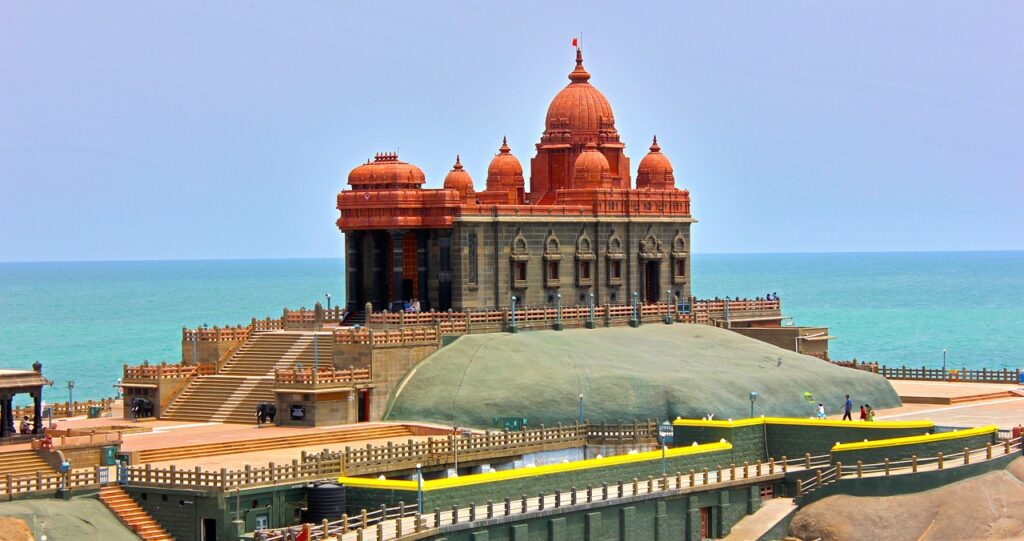
Tamil Nadu boasts a rich and vibrant history, evident in its numerous museums and heritage sites. These treasures offer a captivating glimpse into the bygone eras that shaped the state’s cultural tapestry. Embark on a historical odyssey as we explore some of the most prominent museums and heritage sites in Tamil Nadu:
A Treasure Trove of Artifacts:
- Government Museum, Chennai: This colossal museum houses a vast collection of artifacts spanning centuries. Explore sections dedicated to archaeology, bronzes, anthropology, and Amravati sculptures. The museum also boasts a fascinating mummy collection and a dazzling display of South Indian jewelry.
- Fort St. George Museum, Chennai: Located within the historic Fort St. George, this museum chronicles the British Raj era in India. Witness artifacts related to the East India Company, admire maritime exhibits, and delve into the colonial history of Madras (present-day Chennai).
- Government Museum, Pudukkottai: This museum showcases the rich heritage of the erstwhile Pudukkottai State. Admire exquisite sculptures, a unique collection of musical instruments, and a fascinating display of prehistoric artifacts.
- Thanjavur Maratha Palace Museum: Step back in time within the opulent Thanjavur Maratha Palace. This museum houses a collection of paintings, weaponry, and royal artifacts, offering a glimpse into the lives of the Maratha rulers.
Beyond the Walls of Museums:
- Gangaikonda Cholapuram: This UNESCO World Heritage Site, once the capital of the Chola Empire, is an open-air museum. Explore the magnificent Brihadisvara Temple, adorned with intricate carvings, and witness the remnants of the once-grand city.
- Mahabalipuram: This historical town boasts captivating monuments like the Shore Temple, a UNESCO World Heritage Site, and the Five Rathas (chariots) carved from single granite boulders. Explore the captivating rock-cut sculptures and bas-reliefs depicting mythological tales.
- Kanchipuram: 被称为“千庙之城” (qiānmù zhī chéng) (“City of Thousand Temples”), Kanchipuram is a heritage town dotted with temples dating back centuries. Walk through the historic lanes, explore ancient temples, and witness the town’s famed silk weaving traditions.
A Walk Through Time:
- Planning Your Visit: Research museum opening hours and any entry fees beforehand.
- Guided Tours: Consider opting for guided tours, especially at historical sites, to gain deeper insights into the history and significance of these places.
- Responsible Tourism: Respect the sanctity of these heritage sites and avoid touching or damaging artifacts.
Tamil Nadu’s museums and heritage sites are gateways to the state’s glorious past. These treasures whisper tales of empires that once thrived, artistic expressions that continue to inspire, and traditions that endure. Come, embark on this historical adventure and lose yourself in the captivating stories waiting to be unveiled.
A Celebration of Life: Festivals and Traditional Arts in Tamil Nadu
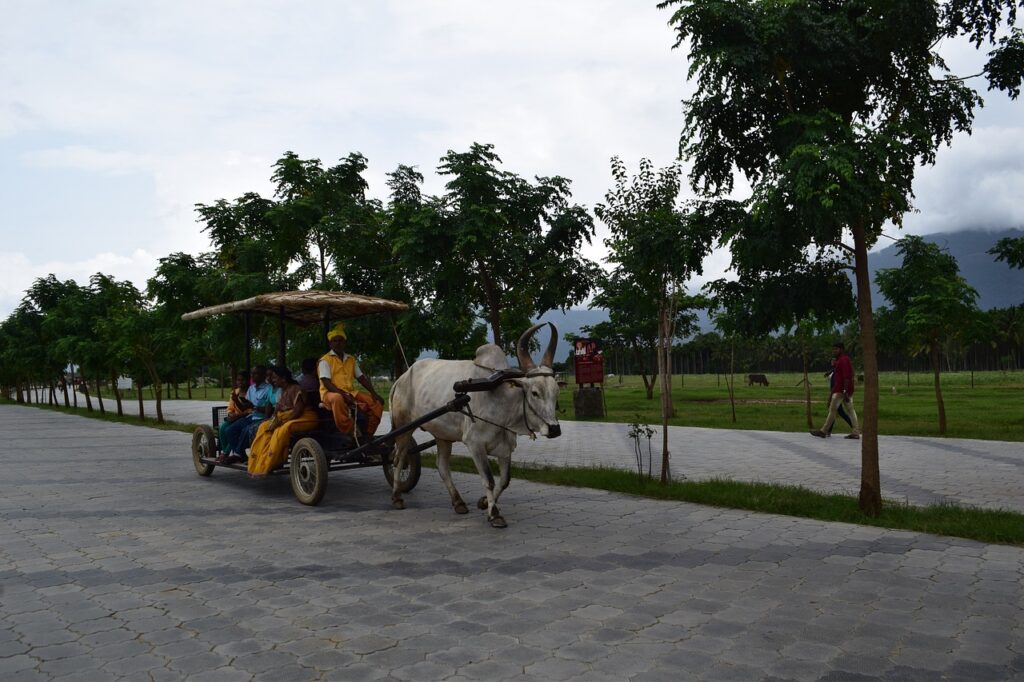
Tamil Nadu pulsates with a vibrant cultural spirit, evident in its diverse festivals and traditional art forms. Witness the fervor of these celebrations and immerse yourself in the artistic heritage that has been passed down through generations.
A Festival for Every Season:
- Pongal (January): This harvest festival is a joyous celebration that marks the beginning of the Tamil month of Thai. Farmers offer their gratitude for a bountiful harvest, decorate their homes with colorful kolams (rangoli), and prepare the sweet dish called Pongal. Jallikattu, a traditional bull-taming sport (now regulated), is also associated with Pongal festivities.
- Tamil New Year (Mid-April): This festival, also known as Puthandu, marks the beginning of the Tamil New Year. Homes are decorated with mango leaves, families gather for elaborate feasts, and people visit temples to seek blessings for the year ahead.
- Natyanjali (April-May): Held in Chidambaram, this classical dance festival celebrates the cosmic dance of Lord Shiva, Nataraja. Witness renowned dancers perform Bharatanatyam, a classical dance form known for its expressive storytelling and intricate footwork.
- Deepavali (October/November): The Festival of Lights is a five-day extravaganza that celebrates the triumph of good over evil. People decorate their homes with lamps and diyas, light firecrackers, and exchange gifts and sweets.
A Tapestry of Traditional Arts:
- Bharatanatyam: Originating in Tamil Nadu, Bharatanatyam is one of India’s oldest and most revered classical dance forms. This expressive dance style tells stories through intricate footwork, hand gestures (mudras), and captivating facial expressions.
- Villuppattu: This traditional art form combines singing and storytelling. Performers narrate captivating tales using rhythmic songs and the accompaniment of the ‘villu pattu’ (bow instrument).
- Silambam: This ancient martial art form involves the use of wooden staffs. Silambam demonstrations showcase impressive displays of agility, flexibility, and combat techniques.
- Kolattam: This energetic folk dance is performed by men with sticks rhythmically tapping the ground. The vibrant costumes and synchronized steps create a visually captivating spectacle.
- Yal Art: This unique art form involves sculpting mythical creatures like the ‘yal’ (a mythical beast with the head of a lion and the body of a horse) from wood or ivory. These intricate sculptures are prized possessions and showcase the craftsmanship of Tamil Nadu’s artisans.
Experiencing the Culture:
- Festival Dates: Festival dates vary each year. Research specific dates before planning your trip.
- Respectful Participation: Dress modestly and be mindful of local customs during festivals.
- Supporting Local Artisans: Purchase souvenirs directly from artisans to support their livelihoods and preserve these art forms.
Tamil Nadu’s festivals and traditional arts are a vibrant tapestry woven with centuries of tradition, faith, and artistic expression. Witnessing these celebrations and appreciating the intricate art forms is an unforgettable way to experience the true essence of Tamil culture. So, come, immerse yourself in the festivities, be mesmerized by the artistry, and discover the soul of Tamil Nadu.
A Culinary Adventure: Unveiling the Flavors of Tamil Nadu
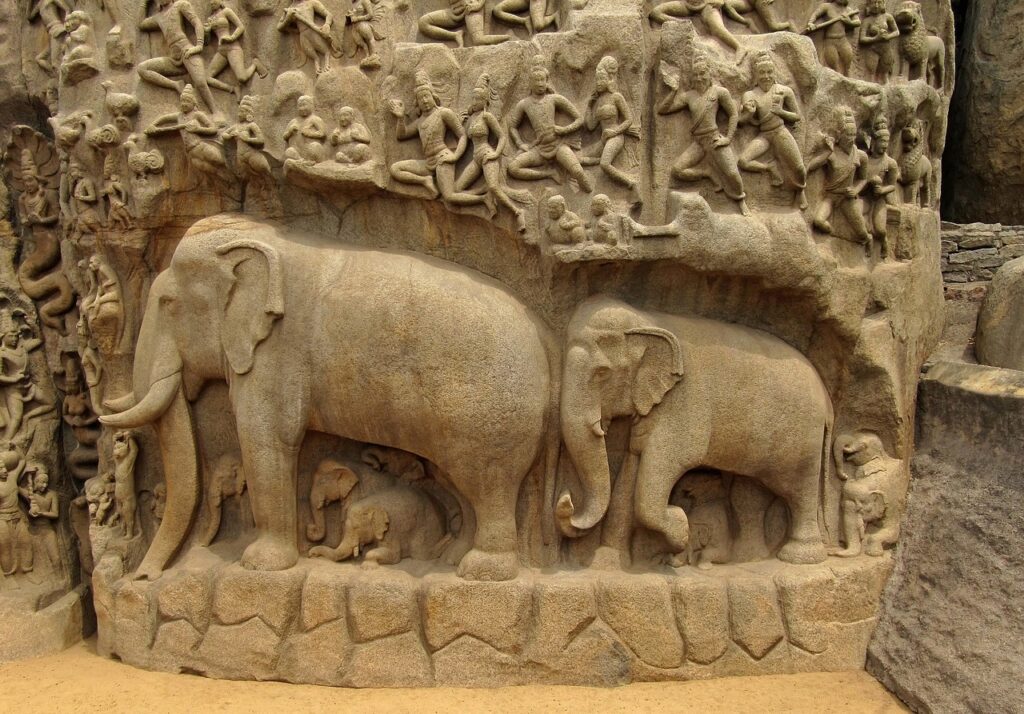
Embark on a tantalizing expedition through the culinary delights of Tamil Nadu. South Indian cuisine is known for its vibrant flavors, aromatic spices, and comforting dishes, and Tamil Nadu takes this culinary experience to a whole new level. Get ready to tantalize your taste buds with a symphony of sweet, savory, and spicy flavors.
A Vegetarian Paradise:
- Idli & Sambar: This quintessential South Indian breakfast duo is a must-try. Steamed rice cakes (idli) are served with a lentil-based stew (sambar) offering a delightful combination of textures and flavors.
- Dosa: A thin, crispy crepe made from fermented rice and black gram batter, dosa is a versatile dish. Enjoy it plain, stuffed with masala potatoes (masala dosa), or dipped in various chutneys (coconut, tomato, or onion).
- Vada: These crispy lentil fritters are a popular accompaniment to sambar or enjoyed as a quick snack.
- Pongal: This dish, not to be confused with the harvest festival, is a savory rice porridge cooked with lentils, ghee, and spices. It’s a comforting and flavorful vegetarian delight.
A World of Flavors:
- Chettinad Cuisine: Hailing from the Chettinad region, this cuisine is known for its bold flavors and generous use of spices. Expect dishes like Chettinad chicken, a fiery curry, or Chettinad fish fry, marinated and cooked to perfection.
- Seafood Specialties: Tamil Nadu’s coastline offers a bounty of fresh seafood. Savor fish curries, fried prawns, or the unique Meen Kuzhambu, a tamarind-based fish curry.
- Filter Kaapi: No South Indian meal is complete without a cup of filter kaapi, a strong coffee decoction brewed in a special filter. Enjoy it hot or add milk and sugar for a sweeter version.
A Sweet Ending:
- Payasam: This creamy rice pudding, flavored with milk, nuts, and cardamom, is a popular dessert option. There are many variations, including mango or jaggery payasam.
- Jalebi: These deep-fried pretzel-shaped pastries dipped in sugar syrup are a sweet and indulgent treat.
Local Delights:
- Street Food: Don’t miss exploring Tamil Nadu’s vibrant street food scene. Sample savory snacks like murukku (deep-fried lentil fritters) or sweet treats like halwa (a dense, fudge-like sweet).
- Vegetarian Options: Tamil Nadu offers a paradise for vegetarians with a vast array of delectable meatless dishes.
Culinary Tips:
- Spice Levels: South Indian cuisine can be spicy. Inform vendors if you prefer a milder version.
- Etiquette: Traditionally, meals are eaten on a banana leaf and food is savored using your right hand. However, restaurants usually provide cutlery.
- Cooking Classes: Immerse yourself in the culture by taking a cooking class and learning to prepare some of these delicious dishes.
Tamil Nadu’s cuisine is a vibrant tapestry of flavors that will tantalize your taste buds and leave you wanting more. From comforting vegetarian fare to fiery curries and delectable sweets, there’s something to satisfy every palate. So, come, embark on this culinary adventure and discover the delicious secrets of Tamil Nadu’s cuisine!
Tamil Nadu: An Adventure Playground Awaits!
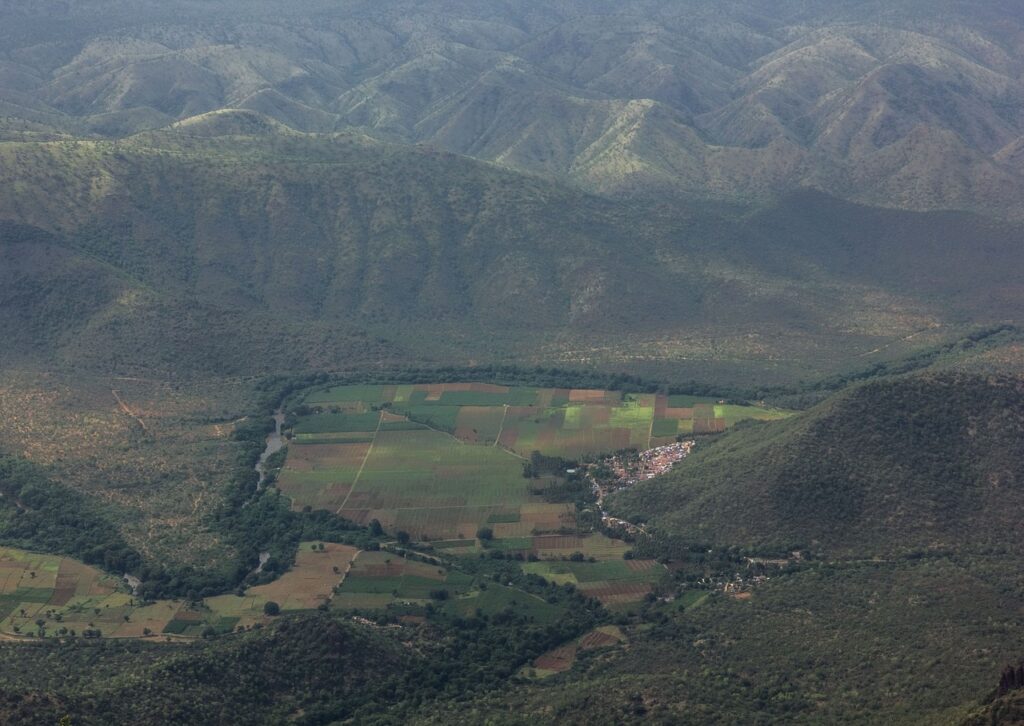
Beyond its rich cultural heritage and stunning landscapes, Tamil Nadu offers a treasure trove of adventure activities for thrill-seekers and outdoor enthusiasts. Get your adrenaline pumping as we explore the exciting possibilities:
Trekking Through Lush Hills:
- The Nilgiris: This UNESCO World Heritage Site boasts scenic trails ideal for trekking enthusiasts. Hike amidst verdant hills, encounter diverse flora and fauna, and witness breathtaking views of the surrounding valleys. Options range from gentle nature walks to challenging multi-day expeditions.
- Kodaikanal: This hill station, also known as the “Princess of Hills,” is a haven for trekkers. Explore trails leading to waterfalls, viewpoints like Dolphin’s Nose, or trek to Guna Caves, a network of ancient caverns.
- Kolli Hills: This lesser-known gem offers a trekking adventure away from the crowds. Trek through coffee plantations, discover hidden waterfalls, and witness panoramic vistas of the surrounding plains.
Watersports Paradise:
- Surfing: Catch some waves at Kovalam or Mahabalipuram, popular destinations for surfing enthusiasts. Learn from experienced instructors or rent a surfboard and conquer the waves.
- Scuba Diving and Snorkeling: Explore the vibrant coral reefs and diverse marine life in the Gulf of Mannar Marine National Park. Witness colorful fish, majestic turtles, and even dolphins in their natural habitat.
- Kayaking and Canoeing: Glide through serene backwaters near Chennai or explore the tranquil waters of Pulicat Lake, a birdwatcher’s paradise.
Thrilling Activities:
- Paragliding: Soar above the scenic landscapes of Yelagiri or Yelagiri Valley and experience breathtaking bird’s-eye views.
- Rock Climbing: Challenge yourself at the various rock climbing sites in Hogenakkal, ideal for both beginners and experienced climbers.
- Ziplining and Adventure Parks: Get your heart racing on zip lines, obstacle courses, and other exciting activities offered by adventure parks in Yelagiri, Ooty, and Coonoor.
Essential Tips:
- Choose the Right Season: The ideal time for trekking in the hills is during the cooler months (October-February). For water sports, calmer seas prevail between November and March.
- Gear Up: Invest in proper footwear, clothing suitable for the activity and weather conditions, and sunscreen.
- Safety First: Always prioritize safety. Opt for guided tours for trekking and adventure activities, especially if you’re a beginner. Be aware of weather conditions and your limitations.
- Respect the Environment: Leave no trace behind. Dispose of waste responsibly and avoid harming the natural environment.
Tamil Nadu’s adventure opportunities promise an unforgettable experience for those seeking thrills and outdoor adventures. From trekking amidst stunning scenery to conquering waves or soaring through the air, the state offers something for every adventurer. So, pack your bags, embrace your adventurous spirit, and get ready to create lasting memories in Tamil Nadu!
Tamil Nadu Welcomes You: A Haven for Every Traveler’s Comfort
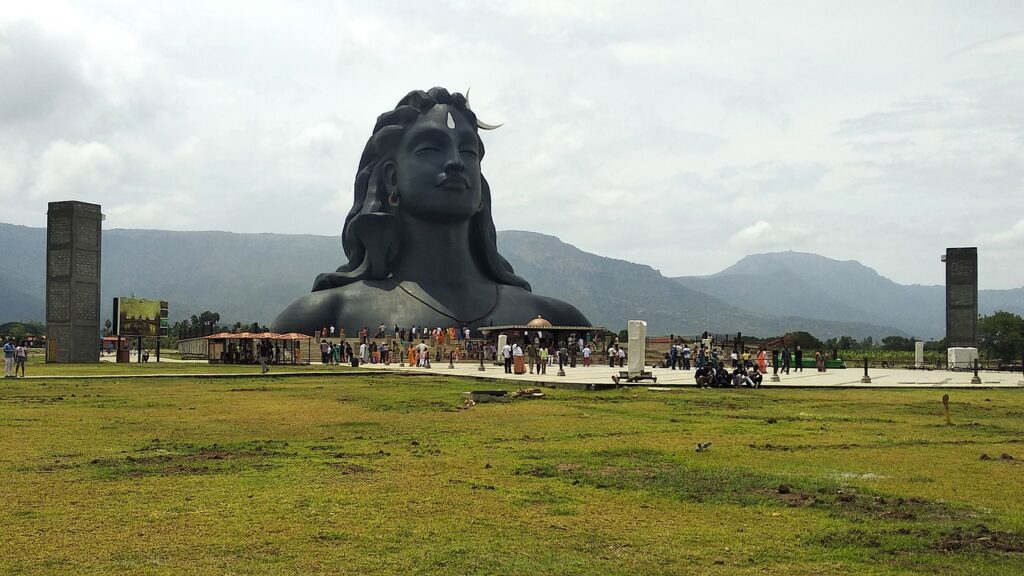
Tamil Nadu offers a diverse range of accommodation options to suit every budget and travel style. From luxurious beach resorts to charming homestays and budget-friendly guesthouses, you’ll find the perfect place to rest and recharge after exploring the state’s many treasures.
Luxury Unveiled:
- Beach Resorts: Indulge in unparalleled hospitality at luxurious beach resorts. Imagine sprawling properties facing the Bay of Bengal, private infinity pools, rejuvenating spa treatments, and delectable dining options. Ideal for those seeking a pampered and relaxing experience.
- Heritage Hotels: Immerse yourself in history by staying at a heritage hotel. Converted palaces, forts, or colonial mansions offer a unique blend of old-world charm, modern amenities, and impeccable service.
- Luxury Jungle Lodges: Nestled amidst lush forests in national parks like Mudumalai, these lodges cater to wildlife enthusiasts. Experience the thrill of spotting wildlife from your balcony or indulge in nature walks and guided safaris organized by the lodge.
Comfort and Convenience:
- Boutique Hotels: For a personalized touch, consider staying at a boutique hotel. These hotels offer stylish accommodations, often with a focus on local design and art, ensuring a comfortable and memorable stay.
- Guest Houses: Guest houses provide a cozy and homely atmosphere. Many are family-run and offer a chance to interact with locals and experience Tamil Nadu’s warm hospitality.
- Business Hotels: Located in major cities like Chennai and Coimbatore, business hotels cater to travelers on the go. They offer comfortable rooms, efficient service, and often have business centers and meeting facilities.
Budget-Friendly Stays:
- Hostels: Hostels are a great option for budget-conscious travelers. These social spaces offer dorm beds or private rooms at affordable prices. They are a great way to meet fellow travelers and share experiences.
- Homestays: Live like a local by staying at a homestay. Experience Tamil Nadu’s culture firsthand by residing in a family home, enjoying home-cooked meals, and interacting with your hosts.
- Pilgrim Lodging: Many temples offer basic accommodation for pilgrims. These no-frills options are perfect for those seeking a simple and inexpensive place to stay near religious sites.
Planning Your Stay:
- Consider the Location: Choose your accommodation based on your proximity to the places you want to visit and your preferred atmosphere (beachfront, city center, etc.).
- Book in Advance: Popular destinations, especially during peak season (December-February), tend to get booked up quickly. Reserve your room well in advance.
- Amenities: Make a list of essential amenities you require (Wi-Fi, air conditioning, etc.) and choose your stay accordingly.
Tamil Nadu’s hospitality sector caters to every traveler. Whether you seek luxurious indulgence, comfortable convenience, or budget-friendly options, you’ll find the perfect accommodation to match your needs and preferences. So, come experience Tamil Nadu’s warmth and hospitality, and let the state’s charm embrace you during your stay.
Conscious Exploration: Sustainable Tourism Initiatives in Tamil Nadu

As tourism flourishes in Tamil Nadu, there’s a growing focus on sustainable practices to protect the state’s rich tapestry of culture, environment, and heritage for future generations. Here’s a glimpse into some of the key sustainable tourism initiatives being undertaken:
Ecotourism Efforts:
- Community-Based Tourism: The Tamil Nadu government actively promotes community-based ecotourism projects. Villages near national parks and wildlife sanctuaries are empowered to manage homestays, conduct nature trails, and offer local crafts, creating economic opportunities while promoting responsible tourism.
- Wildlife Conservation: Revenue generated from eco-tourism initiatives is directed towards wildlife conservation efforts. Anti-poaching measures are strengthened, and local communities are involved in protecting wildlife corridors and habitats.
- Responsible Waste Management: Ecotourism projects emphasize responsible waste management practices. Reducing single-use plastics, composting food waste, and promoting eco-friendly alternatives are some key strategies.
Heritage Conservation:
- Restoration Projects: The government and private organizations undertake restoration projects to preserve historical monuments and temples. Traditional construction techniques and materials are used to ensure the authenticity of these cultural treasures.
- Sustainable Infrastructure: Development of tourist destinations prioritizes sustainable infrastructure. This includes using locally sourced, eco-friendly materials for building hotels and resorts, promoting energy-efficient practices, and utilizing renewable energy sources.
- Skilling Local Communities: Locals are trained in sustainable tourism practices like waste management, water conservation, and responsible interaction with tourists. This empowers them to participate in the tourism industry while safeguarding their cultural heritage.
Travel with Responsibility:
- Support Eco-Lodges: Opt for eco-lodges and sustainable accommodations that prioritize responsible waste management, water conservation, and use of local resources.
- Minimize Your Footprint: Reduce your plastic consumption, conserve water while using hotels, and dispose of waste responsibly.
- Respect Local Cultures: Dress modestly when visiting religious sites, be mindful of local customs, and support local artisans by purchasing souvenirs directly from them.
Building a Sustainable Future:
Sustainable tourism is a collaborative effort. By choosing responsible travel practices and supporting initiatives that protect Tamil Nadu’s environment and culture, we can all contribute to preserving this magnificent state for generations to come. Let’s explore Tamil Nadu consciously, leaving a positive impact and ensuring its treasures continue to thrive.
Getting Around Tamil Nadu: A Guide to Seamless Travel

Tamil Nadu boasts a well-developed transportation network, making it easy for visitors to navigate the state and explore its diverse offerings. Here’s a comprehensive guide to transportation options and travel tips to ensure a smooth and enjoyable journey:
Air Travel:
- Airports: Tamil Nadu has several domestic and international airports, with Chennai International Airport being the major hub. Direct flights connect Chennai to various Indian cities and international destinations. Other airports include Madurai, Coimbatore, Trichy (Tiruchirappalli), Salem, and Coimbatore.
- Booking Flights: Several online travel portals and airline websites offer flight booking options. Consider booking in advance, especially during peak season (December-February).
Train Travel:
- Extensive Network: Tamil Nadu has a vast railway network connecting major cities, towns, and even smaller destinations. Trains offer a comfortable and budget-friendly way to travel.
- Classes: Choose from various classes like air-conditioned sleeper, first class, second class, and unreserved general compartments depending on your budget and preference for comfort.
- Booking Tickets: Tickets can be booked online through IRCTC (Indian Railway Catering and Tourism Corporation) website or mobile app, or at railway stations.
Road Travel:
- Buses: Tamil Nadu has a well-maintained network of government and private buses connecting cities, towns, and villages. Buses offer a convenient and affordable way to travel, especially for shorter distances.
- Taxis and Car Rentals: Taxis and car rentals are readily available in major cities and tourist destinations. Negotiate fares beforehand, especially for taxis, to avoid any surprises. Consider obtaining an International Driving Permit (IDP) if you plan to self-drive.
Local Transportation:
- Rickshaws: Auto rickshaws are a popular mode of transportation for short distances within cities and towns. Agree on the fare before getting in.
- Metros: Chennai Metro Rail provides a convenient and fast way to travel within Chennai city.
Travel Tips:
- Plan Your Itinerary: Research travel options and durations between places you plan to visit to optimize your time.
- Luggage Management: Pack light if you plan to move around frequently using buses or trains.
- Local Language: While English is spoken in major tourist areas, learning a few basic Tamil phrases can go a long way.
- Currency Exchange: Carry some Indian Rupees (INR) in cash for smaller purchases and local transportation, especially in rural areas. ATMs are widely available in cities and towns.
- Safety: Be cautious of your belongings, especially in crowded places.
Additional Considerations:
- Traffic Conditions: Traffic congestion can occur in major cities like Chennai. Factor in travel time when planning your itinerary.
- Monsoon Season: Tamil Nadu experiences monsoon rains from June to September. Roads might be slippery, and some transportation schedules may be affected. Consider these factors while planning your visit.
With a well-developed transportation network and these helpful tips, navigating Tamil Nadu will be a breeze. So, pack your bags, choose your preferred mode of transport, and embark on an unforgettable adventure through the vibrant landscapes and rich cultural tapestry of Tamil Nadu!
Sure, venturing beyond the well-trodden tourist path allows you to discover unique experiences and hidden gems. Here are some offbeat destinations and hidden gems to consider adding to your Tamil Nadu itinerary:
- Poompuhar: Once a bustling port city, Poompuhar is believed to be the ancient city of Kaveri Pattinam, mentioned in ancient Tamil literature. Explore the archaeological excavations, remnants of the historic city walls, and the scenic seashore.
- Athirappilly Falls: Nicknamed the “Niagara of South India,” Athirappilly Falls is a majestic cascade surrounded by lush greenery. Hike up to the top of the falls for breathtaking views or take a refreshing dip in the pool below (during permitted seasons).
- Gingee Fort: This sprawling fort complex, strategically located on a group of granite hills, boasts multiple fortifications, temples, and remains of settlements. Explore the maze of chambers, tunnels, and passageways and delve into the fort’s rich history.
- Kodaikanal Hills: Often referred to as the “Princess of Hills,” Kodaikanal offers a scenic escape amidst rolling hills, serene lakes, and pine forests. Enjoy trekking trails, boat rides on Kodai Lake, or explore historical sites like Guna Caves.
- Yelagiri: This lesser-known hill station near Tiruvannamalai is a haven for nature lovers. Hike amidst scenic trails, explore Swami Malai Hills, or enjoy boating on Punganoor Lake. Yelagiri is also a popular spot for paragliding and offers breathtaking aerial views.
- Tranquebar (Tranquebar): Founded by the Danes in the 17th century, Tranquebar (also known as Tranquebar) boasts a unique colonial legacy. Explore the Danish Fort, stroll along the scenic beach, and visit the Zion Church, one of the oldest Protestant churches in India.
- Meenakshi Temple, Madurai: This magnificent temple complex, dedicated to Parvati (Meenakshi) and Shiva (Sundareswarar), is a masterpiece of Dravidian architecture. Marvel at the intricate carvings, towering gopurams (gateway towers), and the Hall of Thousand Pillars, a must-visit for art and architecture enthusiasts.
- Chettinad Villages: Chettinad, a region renowned for its unique Chettinad cuisine and architectural style, offers a glimpse into Tamil Nadu’s rich heritage. Explore the sprawling mansions with intricate woodwork, visit antique shops, and indulge in a flavorful Chettinad meal.
When exploring offbeat destinations, it’s important to be prepared. Research transportation options, accommodation availability, and dress modestly, especially when visiting religious sites. By venturing off the mainstream tourist trail, you’ll discover the hidden gems of Tamil Nadu and gain a deeper appreciation for its culture and beauty.
Tamil Nadu Tourism in the Digital Age: A Tech-Savvy Embrace for Unforgettable Experiences

As technology transforms the travel landscape, Tamil Nadu is at the forefront, leveraging digital tools to enhance the visitor experience. Here’s how Tamil Nadu tourism is embracing the digital age:
Enhancing Discovery:
- Virtual Reality (VR) Experiences: Imagine exploring the majestic Meenakshi Temple or trekking through the Nilgiri Hills from the comfort of your home. VR experiences showcased on the Tamil Nadu Tourism website and social media platforms can be a great way to virtually explore the state’s treasures and spark travel desires.
- 360° Tours: Interactive 360° tours of popular destinations like museums, forts, and beaches allow potential visitors to virtually explore these locations before their trip. This can help them plan their itineraries and decide which places to prioritize.
- Augmented Reality (AR) Apps: Imagine pointing your phone at a historical monument and seeing it come alive with informative overlays or historical reenactments. AR apps can revolutionize sightseeing in Tamil Nadu, offering an interactive and engaging way to learn about the state’s rich heritage.
Simplifying Planning:
- Online Ticketing Platform: A centralized online ticketing platform can streamline the process of booking entry tickets for forts, temples, museums, and other attractions. This eliminates long queues and allows visitors to plan their itineraries efficiently.
- Travel Information App: A comprehensive travel information app can provide visitors with everything they need to know about Tamil Nadu, from transportation options and accommodation listings to cultural dos and don’ts, local food recommendations, and curated itineraries based on interests and travel duration.
- Interactive Maps: Interactive maps with real-time traffic updates, tourist information points, and geo-tagged attractions can empower visitors to navigate the state seamlessly and discover hidden gems near their current location.
Personalized Experiences:
- AI Chatbots: AI-powered chatbots on the Tamil Nadu Tourism website or social media platforms can answer visitor queries 24/7 in multiple languages. This can provide personalized recommendations, address travel concerns, and offer real-time assistance.
- Recommendation Engine: Based on a visitor’s interests and travel preferences, a recommendation engine can suggest customized itineraries, hidden gems off the beaten path, and experiences tailored to their specific desires.
- Social Media Engagement: Engaging social media campaigns showcasing user-generated content, virtual tours, and interactive polls can create a community of Tamil Nadu enthusiasts. This fosters a sense of connection and encourages travelers to share their experiences.
By embracing these technological advancements, Tamil Nadu tourism is ensuring a smoother, more informed, and personalized travel experience for visitors. From virtual exploration to real-time information and AI-powered assistance, technology is transforming the way tourists discover, plan, and experience the wonders of Tamil Nadu. So, pack your bags, download the apps, and get ready for a tech-savvy adventure through Tamil Nadu!
Unveiling the Enchantment: A Glimpse into the Magic of Tamil Nadu
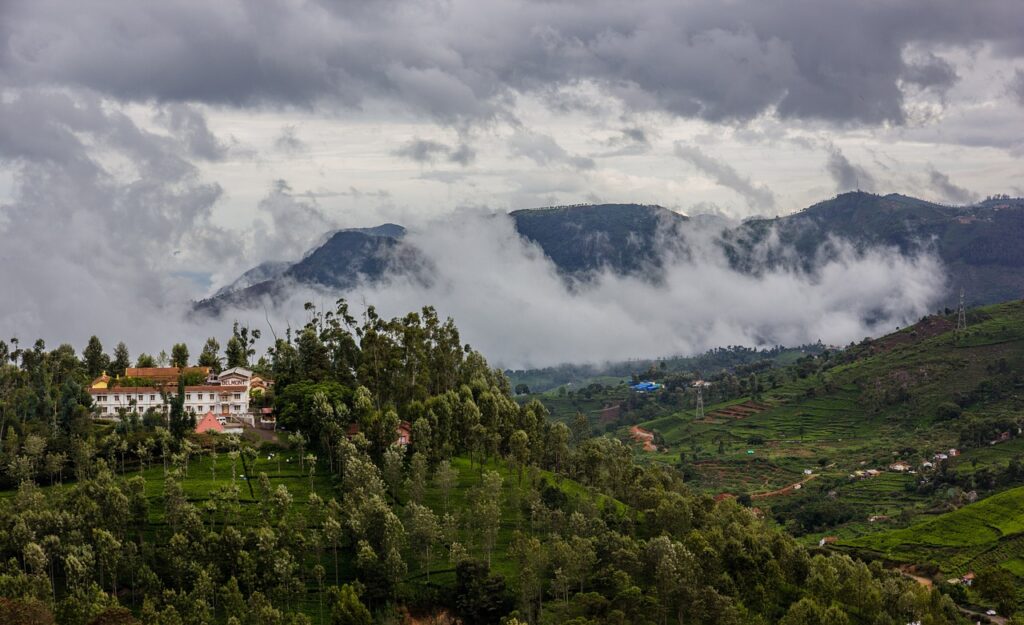
Tamil Nadu unfolds like a captivating tapestry, woven with threads of rich history, vibrant culture, breathtaking landscapes, and delectable cuisine. From the architectural marvels of ancient temples to the serene beauty of hill stations, Tamil Nadu offers an unforgettable experience for every kind of traveler.
This glimpse into Tamil Nadu’s diverse offerings has hopefully ignited your wanderlust. Whether you seek cultural immersion, adventurous thrills, a relaxing beach vacation, or a journey through historical grandeur, Tamil Nadu has something to enthrall you.
Beyond the Guidebook:
As you delve deeper into planning your trip, remember, this is just a starting point. Numerous hidden gems and offbeat experiences await exploration. Engage with local communities, explore the bustling bazaars, and savor the authentic flavors of Tamil Nadu’s unique cuisine.
Responsible Travel:
Embrace sustainable practices throughout your journey. Minimize your environmental impact, respect local customs and traditions, and support local businesses and artisans.
A Lasting Impression:
Tamil Nadu beckons you to embark on an enriching adventure. Come, experience the warmth of its people, the captivating beauty of its landscapes, and the timeless spirit of its culture. Let Tamil Nadu weave its magic and create memories that will last a lifetime.
